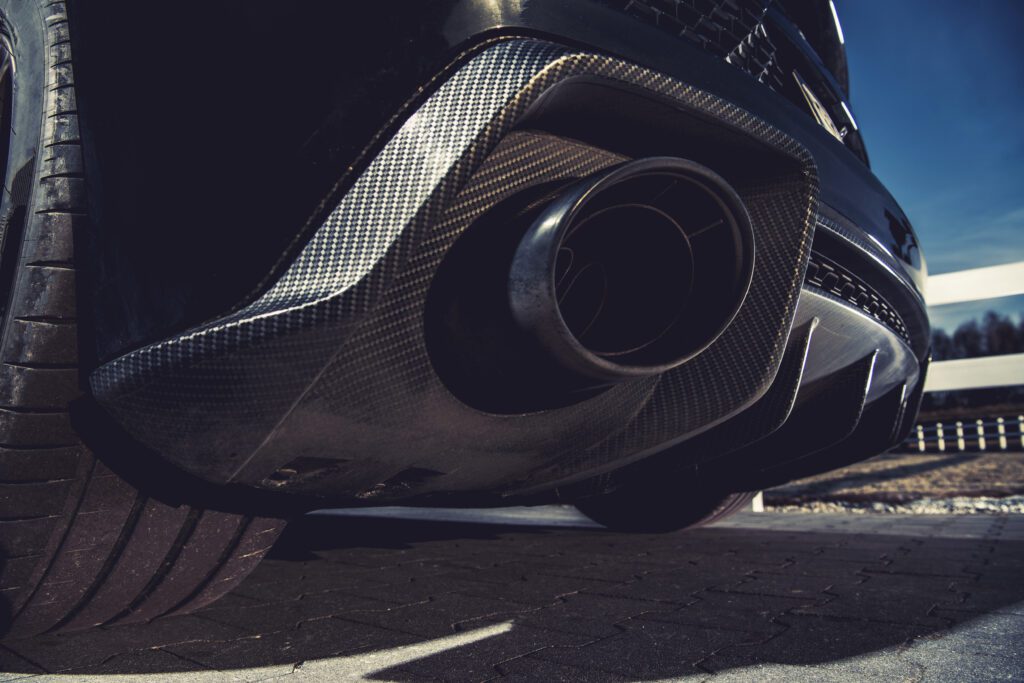Your car’s engine works by making thousands of tiny explosions that push against the pistons. This, in turn, rotates the crankshaft, which eventually helps you drive your vehicle’s wheels. These tiny explosions tend to produce many leftover gases, better known as exhaust gases, which are made up of potentially dangerous chemicals like hydrocarbons, carbon monoxide, and nitrogen oxide.
If you wish to keep everyone in the vehicle safe, these chemicals need to exit the car safely, ensuring that they do not enter inside and cause any harm. A vehicle’s exhaust system comprises a series of piping and parts that help redirect these toxic gases towards the rear of your vehicle.
Parts That Make Up The Exhaust System

What Parts Make Up The Exhaust System?
An exhaust system comprises numerous parts such as the exhaust manifold, catalytic converter, muffler, and exhaust pipe. The exhaust bellows also come into play within the system, ideally in exhaust pipe connectors.
These exhaust bellows ensure that all toxic gases are carried through the exhaust pipe connector and complete the system successfully and safely exit from the tailpipe.
For an exhaust pipe connector to be effective, it is often made using stainless steel since it has excellent corrosion resistance, which gives you a longer service life.
Now, let’s take a deeper look at all the other parts of an exhaust system:
Exhaust Manifold
The exhaust manifold is a solid cast-iron piece usually bolted directly onto the engine block and makes up the initial section of your vehicle’s exhaust system.
Its job is to collect all the gasses from the engine cylinders into a single pipe and direct it through the catalytic converter.
Common signs that suggest your exhaust manifold is damaged include decreased power, excessive engine noise, and a burning smell coming from the engine, fuel efficiency, and acceleration.
Catalytic converter
The next critical piece of your car’s exhaust system is the catalytic converter. It is designed to reduce the overall air pollution by converting any unburned nitrogen, hydrocarbons, and carbon monoxide into water and carbon dioxide.
The catalytic converter works by creating a chemical reaction when these toxins come in contact with the catalysts. The catalysts are a substance that can change these gases’ chemical composition without getting consumed in the process.
With time, your catalytic converters may get overheated, contaminated, clogged, or damaged physically, which may result in causing issues with your vehicle’s performance or even a complete engine shutdown.
Hangers
An exhaust system starts from the front of a car and goes to the back. This is why we require hangers to ensure that all the pipes and parts are held in place.
These hangers are usually made up of rubber and are stretched to secure the exhaust system properly. Since it is made out of rubber, it also helps you reduce any friction or noise.
Hangers tend to have a universal design which means that you do not require a specific model that fits your vehicle. If you have a missing or damaged hanger, your vehicle’s exhaust pipe or tailpipe may end up dropping on the ground.
Exhaust Joints
Exhaust joints are made to secure your hangers and fit pipe connections like the piping to your muffler. Usually, there are four different types of exhaust joints: ball and socket, U-bolt, V-band clams, and flat band.
Hangers and exhaust joints do not need welding like other parts of the exhaust system, which is why they are easy to replace. Without exhaust joints, your exhaust system may get disconnected or loose.
Muffler
We have already discussed how your engine creates power from small explosions. If not filtered, these explosions tend to be loud.
Mufflers are built to reduce this noise by rerouting the sound waves through a series of chambers and tubes. The volume gets decreased significantly as the noise bounces around within the muffler.
A missing or damaged muffler will result in a higher-than-normal sound coming from the engine. Though a few people prefer a louder vehicle, there can be laws in your area that may restrict how loud your car can be.
The Exhaust Pipe
The exhaust pipe directs the gases from the manifold to the tailpipe of your vehicle’s exhaust system from the vehicle’s front end to the back.
The end of an exhaust pipe is often capped with a tailpipe. This piece protrudes from the back of your vehicle and releases exhaust gases out of the car.
Any damage to the exhaust pipe might result in a leakage which can cause a fire or harm all surrounding components.
An Exhaust System is Critical For Your Car!
Now you understand how critical an exhaust system is for your vehicle’s engine. As the owner, it is your responsibility to keep your car and its components in good working condition. If not maintained, a faulty exhaust system may result in poor mileage and engine performance.
Instead of managing with lower gas mileage and significantly louder sound, it would be best if you got your vehicle repaired by a professional from Aloha Auto Repair as soon as possible.
Contact Aloha Auto Repair Today!
If you live in Allen, TX, and are looking for an auto repair shop, then you need to get in touch with Aloha Auto Repair today!
We have a team of professional automotive experts who will deliver high-quality results and provide you with an honest and pleasant service experience.
Give us a call at (469) 656-1124 or contact us online, and we will fix all issues that your vehicle may have. By hiring our professional service, you can pay attention to other important tasks while our professionals improve your vehicle’s performance.
FREQUENTLY ASK QUESTIONS
What are the main parts of a car’s exhaust system?
The main parts are the exhaust manifold, catalytic converter, muffler, and tailpipe.
What does the exhaust manifold do?
It collects gases from the engine and sends them to the rest of the exhaust system.
What is a catalytic converter for?
It helps clean the harmful gases before they leave the car, making the air less dirty.
What does the muffler do?
The muffler makes the car quieter by reducing engine noise.
How do I know if a part of my exhaust system is bad?
You might hear loud noises, smell bad fumes, or see lower gas mileage.






